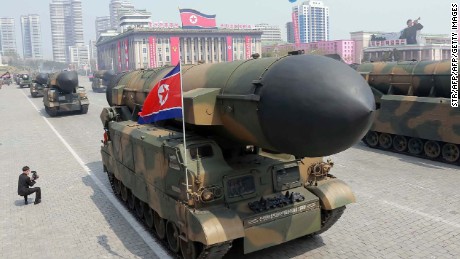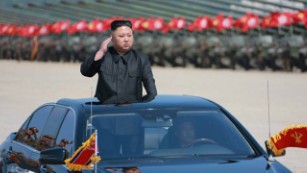North Korea's missile test fails, US military says
A ballistic missile launched early Saturday by North Korea in defiance of international pressure and at a time of heightened regional tensions appears to have failed.
The missile blew up over land in North Korean territory, said US Navy Cmdr. Dave Benham, a spokesman for the US Pacific Command.
US President Donald Trump cast the launch as a direct snub against China, one of North Korea's only allies and a nation seen by the Trump administration as a potential US ally in efforts to stamp out Pyongyang's nuclear program.
"North Korea disrespected the wishes of China & its highly respected President when it launched, though unsuccessfully, a missile today. Bad!" Trump tweeted.
Pyongyang's show of defiance -- at a time when its military ambition has reached its highest level in years -- came just hours after US Secretary of State Rex Tillerson addressed a special meeting at the United Nations and called for increased pressure on North Korea.
"All options for responding to future provocations must remain on the table," Tillerson said. "Diplomatic and financial leverage or power will be backed up by willingness to counteract North Korean aggression with military action, if necessary."
The launch was swiftly condemned by South Korean and Japanese leaders.
'Continuously playing with fire'
South Korea called it a "provocative action," saying it clearly violated UN Security Council resolutions and constituted a serious threat to peace and security.
"It demonstrates once again the regime's belligerence and recklessness of categorically disobeying the international community's resolve to achieve the denuclearization of North Korea," the foreign ministry said.
South Korean officials also said the test likely was a failure.
"We are analyzing additional information," the nation's Joint Chiefs of Staff said. "Our military is maintaining a thorough defense posture while keeping a close eye on the possibility of North Korea's further provocations."
Japan protests
Japan launched a protest through its diplomatic channel in Beijing, Chief Cabinet Secretary Yoshihide Suga said.
Japan won't tolerate repeated provocative actions by North Korea and asked the Japanese public to remain calm, Suga said.
Tokyo's subway operator temporarily halted train service Saturday morning after the missile launch, the Tokyo Metro said. All trains stopped running for 10 minutes, then resumed service after it was confirmed the launch had no impact on Japan's safety. An estimated 13,000 people were affected, an official said.
White House officials said Trump was briefed as Air Force One returned to Maryland from Atlanta, where the President earlier addressed a meeting of the National Rifle Association.
The test-fired missile probably was a medium-range ballistic missile called a KN-17, a US official told CNN. The KN-17 is a land-based solid-fuel missile fired from a mobile launcher.
A US military assessment found the main part of the missile landed about 35 kilometers (22 miles) from Pukchang airfield, the US official said.
There has been no announcement on North Korean state television, CNN's Will Ripley in Pyongyang reported.
Analyst: Launch 'preordained' by North Korea
Trump's administration has delivered a drumbeat of warnings about the dangers of North Korea this week, using presidential statements, an unusual White House briefing for the Senate, and a White House lunch for UN ambassadors to underscore that Pyongyang is a priority.
The US military has moved an aircraft carrier strike group into the region, docked a powerful nuclear submarine in South Korea and staged large military drills with South Korea and Japan.
New joint drills with the USS Carl Vinson and the Korean navy began Saturday in waters off the Korean Peninsula, a South Korean military spokesman said.
In light of those actions, Saturday's launch amounts to a message from the regime of North Korean leader Kim Jong Un to the United States and others, said John Kirby, a CNN military and diplomatic analyst.
Homeland Security secretary: Kim Jong Un 'knows what he's doing'
"This is Kim giving us the finger, giving China the finger, giving the UN the finger," he said. "I think timing is absolutely planned and preordained in his mind."
There is no such thing as a failed missile attempt for Kim, Kirby said.
"He learns from every single attempt, and he gets knowledge, and he gets intel," the analyst said. "And he takes those lessons learned and just churns them right over into the next one."
Risk of conflict simmers
North Korea has been "provocative all along," US Deputy National Security Adviser K.T. McFarland said when asked whether the missile test was provocative.
But "there is reason to be concerned" about North Korea's missile tests, she added.
Trump this week said there's "a chance that we could end up having a major, major conflict with North Korea," but added he would prefer a diplomatic resolution.
Washington is hopeful the Chinese can help.
Why hasn't North Korea conducted its sixth nuclear test?
China has threatened North Korea with sanctions if the regime conducts a nuclear test, Tillerson told Fox News on Thursday. North Korea conducted its fifth nuclear test last fall, and observers have said a sixth test could come soon.
China remains one of North Korea's only allies and is responsible for much of the heavily-sanctioned nation's economy.
North Korea on Saturday said it is developing nuclear weapons for self-defense and as a deterrent to the United States, according to an unofficial translation of a statement released by an official in Pyongyang's mission to the UN. The statement, which came in response to CNN's questions about the latest launch, did not acknowledge Saturday's missile test.
North Korea timeline: From Trump's inauguration to now
Launch follows special UN meeting
North Korea has attempted at least nine missile launches on six occasions since Trump was inaugurated in January. Some of those missiles reached the Sea of Japan, also known as the East Sea.
The United States called Friday's UN meeting to call for greater sustained pressure on Pyongyang.
At the meeting, South Korea's foreign minister urged proactive sanctions.

Inside a North Korean home
"The council has repeatedly warned that it will take 'further significant measures, including sanctions' in the case of future provocations," Yun Byung-se said. "But Pyongyang may still harbor the illusion that the Security Council will only take limited action and that it can disregard and ridicule the authority of the UN."
Poll: 37% of Americans see North Korea as an 'immediate threat'
Uruguay's UN Ambassador Elbio Rosselli, who sits on the UN Security Council, condemned the missile test as "very disgraceful" and "against international law and humanity."
Italian UN ambassador Sebastiano Cardi, who heads the UN committee that could sanction North Korea, said he hoped Pyongyang would "refrain from any other further escalation."
With less than two weeks until South Korea votes for a new president, the spokesman for the frontrunner, Moon Jae-in, called on North Korea to stop its military tests.
"We urge the North Korean regime to immediately stop its reckless provocations, give up its nuclear ambitions and cooperate with the international community," Democratic Party spokesman Park Kwang-on said. "That would be the only way it can save itself, instead of taking the path of destruction."
News Courtesy: www.cnn.com












